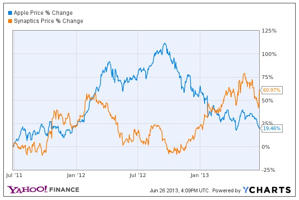Synaptics Gains as Anti-Apple of the Smartphone Market
What used to be a big problem for Synaptics (SYNA) investors is now proving to be a big win — one worthy of an 11% jump in the company's share price so far on Wednesday, and a 33% rise year to date.

Synaptics sells chips that control the touchscreens on almost every new smartphone, from the Samsung Galaxy S4 to the Blackberry Z10. But there’s one giant hole in Synaptics's client list: the Apple (AAPL) iPhone.
However, after grabbing contracts for the latest Samsung, Blackberry (BBRY), Nokia (NOK) and HTC devices, the San Jose-based company Tuesday night announced a surprise jump in projected revenue for the current quarter.
Analysts had expected less than $200 million in revenue for the calendar second quarter (Synaptics's fiscal fourth quarter). But Synaptics said it collected between $227 million and $230 million with a gross profit of around 50%, also above analyst expectations.
On August 1, when the company officially reports its quarterly figures, revenue growth will approach 66% from a year earlier and 40% from the first quarter. Apple, meanwhile, has struggled with a slowing growth rate for iPhone sales and questions about its competitiveness in less-wealthy countries, where new sales are still accelerating.
That’s made Synaptics the anti-Apple of smartphone investing plays.
Shares of Synaptics, which once supplied chips for the iPod and other Apple products, were in decline last year, when iPhone sales were booming and Apple was racing to its all-time high of $705.07.
Still, longer-term, Synaptics faces several challenges. As seemingly every man, woman and child on earth gets their own mobile distraction device, growth in the overall smartphone market is quickly reaching a saturation point. And Synaptics's top mobile clients, such as Samsung and HTC, have been hit in the past few weeks as sales of new models fell well short of expectations. Synaptics has grown in part by adding new customers but, as it expands, its fate will be more closely linked to broader trends.
The stock is hardly cheap, trading at a price-to-earnings ratio of almost 21. And a unit which supplies chips for laptop touchpads could come under pressure if the PC market continues to shrink.
But, for now, being the anti-Apple is in the market’s sweet spot.

